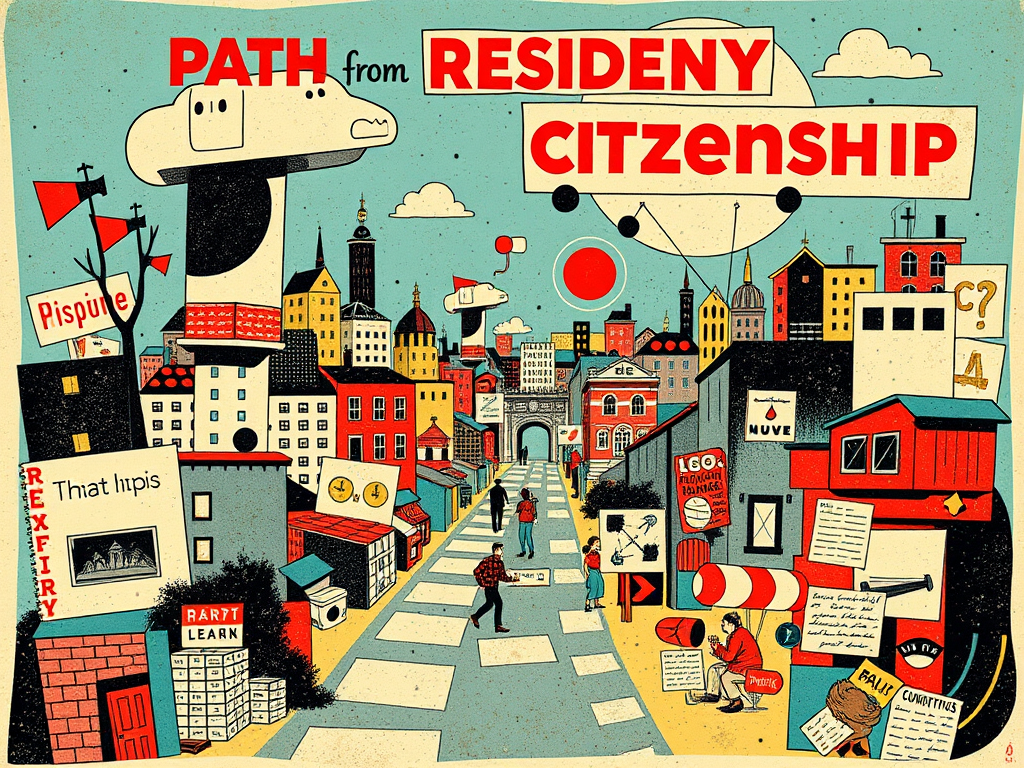
From Golden Visa to Citizenship: Is Naturalization Possible and How?
Reading time: 15 minutes
Table of Contents
- Introduction to Golden Visa Programs
- The Path from Golden Visa to Citizenship
- Golden Visa Programs Around the World
- The Naturalization Process
- Economic Impact of Golden Visa Programs
- Challenges and Controversies
- Future Outlook for Golden Visa Programs
- Conclusion
- FAQs
1. Introduction to Golden Visa Programs
Golden Visa programs have emerged as a powerful tool for countries seeking to attract foreign investment and high-net-worth individuals. These programs offer residency permits, and in some cases, a path to citizenship, in exchange for significant investments in the host country. As we delve into the intricacies of these programs, it’s crucial to understand their economic implications and the potential they hold for both investors and host nations.
The concept of Golden Visas has gained traction globally, with numerous countries implementing their own versions to capitalize on the influx of foreign capital. These programs typically require investments in real estate, government bonds, or local businesses, with minimum thresholds varying significantly between jurisdictions. For instance, while some may require a buy house in greece worth €250,000, others might demand investments upwards of €2 million.
The Appeal of Golden Visa Programs
The allure of Golden Visa programs lies in their ability to offer a range of benefits to investors, including:
- Freedom of movement within the Schengen Area (for EU programs)
- Access to high-quality healthcare and education systems
- Potential tax benefits
- A pathway to citizenship in some countries
For host countries, these programs represent a significant source of foreign direct investment, often channeled into sectors crucial for economic growth, such as real estate and infrastructure development.
2. The Path from Golden Visa to Citizenship
While Golden Visa programs primarily offer residency rights, many investors are interested in the potential for eventual citizenship. The journey from holding a Golden Visa to acquiring citizenship is a complex process that varies significantly between countries. Some nations offer a clear and relatively swift path to naturalization, while others maintain stricter requirements or longer waiting periods.
Key Factors Influencing Citizenship Eligibility
Several factors typically influence an investor’s eligibility for citizenship through a Golden Visa program:
- Duration of residency: Most countries require a minimum period of continuous residency before citizenship can be granted.
- Language proficiency: Demonstrating proficiency in the official language(s) of the host country is often a requirement.
- Cultural integration: Some nations require applicants to pass tests on the country’s history, culture, and political system.
- Clean criminal record: A clear background check is universally required for citizenship applications.
- Continued investment: Maintaining the initial investment throughout the residency period is typically necessary.
It’s important to note that the path to citizenship is not guaranteed and can be subject to changes in legislation or political climate. Investors should carefully consider their long-term goals and the specific regulations of their chosen country before committing to a Golden Visa program.
3. Golden Visa Programs Around the World
Golden Visa programs have been implemented across various regions, each with its unique features and requirements. Understanding the global landscape of these programs is crucial for potential investors to make informed decisions.
European Union Programs
Several EU member states offer Golden Visa programs, with popular destinations including:
- Portugal: Requires a minimum investment of €500,000 in real estate or €1 million in capital transfer.
- Spain: Demands a real estate investment of at least €500,000 or a €2 million investment in Spanish government bonds.
- Greece: Offers one of the most affordable programs, with a minimum real estate investment of €250,000.
- Malta: Provides a path to citizenship with a combined investment and contribution of around €1 million.
Non-EU Programs
Outside the EU, several countries have established competitive Golden Visa schemes:
- United States (EB-5 Program): Requires a minimum investment of $900,000 in targeted employment areas or $1.8 million elsewhere.
- Caribbean nations: Countries like St. Kitts and Nevis, Dominica, and Antigua and Barbuda offer citizenship-by-investment programs with investments starting from $100,000.
- Turkey: Offers citizenship with a minimum real estate investment of $250,000.
Each program comes with its own set of advantages and considerations, from tax implications to residency requirements and paths to citizenship. Investors must carefully weigh these factors against their personal and financial objectives.
4. The Naturalization Process
The naturalization process for Golden Visa holders varies significantly depending on the host country. However, there are some common elements that most countries incorporate into their citizenship requirements.
Common Steps in the Naturalization Process
- Fulfilling the residency requirement: This typically involves maintaining physical presence in the country for a specified number of days each year.
- Language proficiency: Demonstrating competence in the official language(s) of the country, often through standardized tests.
- Civic knowledge: Passing an exam on the country’s history, culture, and political system.
- Character assessment: Providing evidence of good moral character and a clean criminal record.
- Financial stability: Proving continued financial independence and maintenance of the initial investment.
- Oath of allegiance: Swearing loyalty to the host country and its constitution.
It’s important to note that the naturalization process can be lengthy, often taking several years from the initial Golden Visa investment to the granting of citizenship. During this time, investors must remain compliant with all visa conditions and actively work towards meeting the citizenship criteria.
5. Economic Impact of Golden Visa Programs
Golden Visa programs have a significant economic impact on host countries, influencing various sectors and contributing to overall economic growth. Understanding these effects is crucial for both policymakers and potential investors.
Key Economic Indicators Affected by Golden Visa Programs
- Foreign Direct Investment (FDI): Golden Visa programs often lead to substantial increases in FDI, particularly in real estate and other targeted sectors.
- Job Creation: Investments in businesses and real estate development can generate new employment opportunities for local populations.
- Real Estate Market: Many programs focus on real estate investment, potentially leading to price increases and market stimulation.
- Tax Revenue: High-net-worth individuals attracted by these programs can contribute significantly to the host country’s tax base.
- Economic Diversification: Some countries use Golden Visa programs to attract investment in specific industries, promoting economic diversification.
While the positive economic impacts are often emphasized, it’s important to consider potential drawbacks, such as the risk of real estate bubbles or the concentration of foreign ownership in certain sectors. Policymakers must carefully balance these factors to ensure sustainable economic benefits.
6. Challenges and Controversies
Despite their potential economic benefits, Golden Visa programs have faced significant challenges and controversies. These issues have led to increased scrutiny and, in some cases, program modifications or suspensions.
Key Concerns Surrounding Golden Visa Programs
- Money Laundering: There are concerns that these programs could be used to launder illicitly obtained funds.
- Security Risks: Some critics argue that Golden Visas could potentially allow individuals with criminal backgrounds to gain access to countries.
- Social Inequality: The influx of wealthy foreign investors can exacerbate housing affordability issues for local populations.
- Political Influence: Concerns have been raised about the potential for foreign investors to gain undue political influence in host countries.
- EU Pressure: For EU member states, there has been increasing pressure from the European Commission to tighten regulations around Golden Visa programs.
In response to these challenges, many countries have implemented stricter due diligence processes and more rigorous background checks for Golden Visa applicants. Some have also introduced measures to ensure that investments benefit local communities more directly.
7. Future Outlook for Golden Visa Programs
As we look to the future, Golden Visa programs are likely to evolve in response to changing global economic conditions, political pressures, and regulatory environments. Several trends are emerging that could shape the landscape of these programs in the coming years.
Emerging Trends in Golden Visa Programs
- Increased Scrutiny: Expect more rigorous vetting processes and stricter compliance measures to address security and money laundering concerns.
- Diversification of Investment Options: Countries may introduce more diverse investment categories to align with national economic goals and attract a wider range of investors.
- Focus on Sustainable Investments: There may be a shift towards encouraging investments in green technologies and sustainable development projects.
- Digital Nomad Visas: Some countries might integrate elements of digital nomad visas into their Golden Visa programs to attract high-skilled remote workers.
- Regional Cooperation: We might see increased cooperation between countries to standardize practices and prevent abuse of these programs.
Despite challenges, the demand for Golden Visa programs is likely to persist, driven by global economic uncertainties and the desire for increased mobility among high-net-worth individuals. However, the programs that will thrive are those that can effectively balance economic benefits with robust regulatory frameworks and social responsibility.
8. Conclusion
Golden Visa programs represent a complex intersection of immigration policy, economic strategy, and global mobility. While they offer significant opportunities for both investors and host countries, they also present challenges that require careful navigation and ongoing policy refinement.
For potential investors, the path from Golden Visa to citizenship is not always straightforward. It requires careful consideration of various factors, including investment requirements, residency obligations, and naturalization processes. The decision to pursue a Golden Visa should be made with a clear understanding of both the opportunities and responsibilities it entails.
For host countries, these programs can be powerful tools for attracting foreign investment and stimulating economic growth. However, they must be implemented and managed with care to ensure they deliver sustainable benefits without compromising national security or social cohesion.
As we move forward, the evolution of Golden Visa programs will likely reflect broader trends in global mobility, economic development, and international relations. Staying informed about these developments will be crucial for both investors and policymakers in navigating this dynamic landscape.
Ultimately, the success of Golden Visa programs will depend on their ability to adapt to changing circumstances while maintaining a balance between economic objectives, security concerns, and social responsibility. As the global economy continues to evolve, so too will the nature and implementation of these influential immigration and investment schemes.
FAQs
-
Q: How long does it typically take to obtain citizenship through a Golden Visa program?
A: The timeline varies significantly between countries. Some may offer citizenship after 5 years of residency, while others may require up to 10 years or more. It’s crucial to research the specific requirements of each country’s program.
-
Q: Can I maintain my original citizenship when obtaining a new one through a Golden Visa program?
A: This depends on the laws of both your home country and the country granting citizenship. Some countries allow dual citizenship, while others require you to renounce your original citizenship. Always consult with legal experts in both jurisdictions.
-
Q: Are there any Golden Visa programs that don’t require physical residency?
A: While most programs require some level of physical presence, the requirements vary. Some Caribbean citizenship-by-investment programs have minimal or no residency requirements. However, for EU countries, physical residency is typically necessary for eventual citizenship.
-
Q: Can my family members also benefit from my Golden Visa investment?
A: Many Golden Visa programs allow investors to include immediate family members (spouse and dependent children) in their application. However, the specific definitions of eligible family members can vary between programs.
-
Q: What happens if the country changes its Golden Visa laws after I’ve made my investment?
A: While most countries try to grandfather existing investors under the rules in place at the time of their investment, changes in law can affect future benefits or pathways to citizenship. It’s important to stay informed about potential legislative changes and consult with legal experts regularly.

Article reviewed by Sophia Georgiadou, Global Expansion Consultant | Market Entry Strategist | Breaking Into Emerging Markets with Tailored Localization Plans, on May 15, 2025




